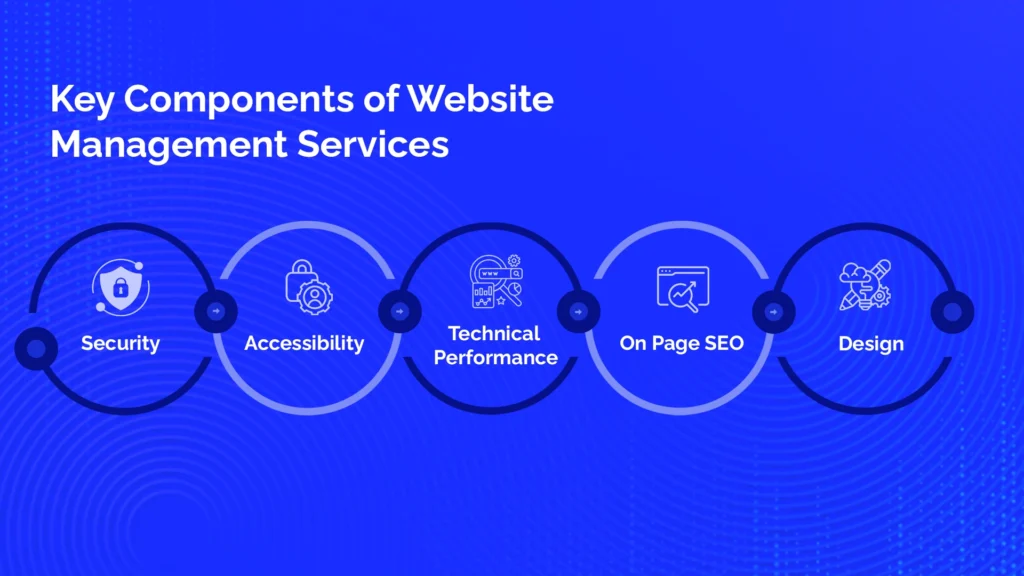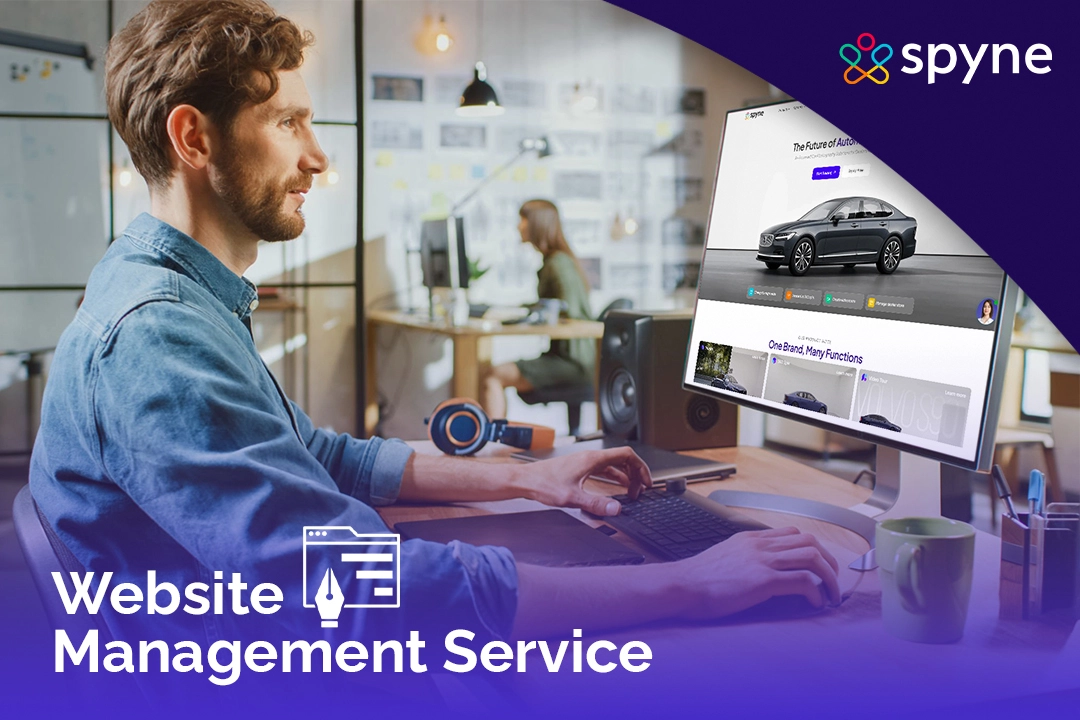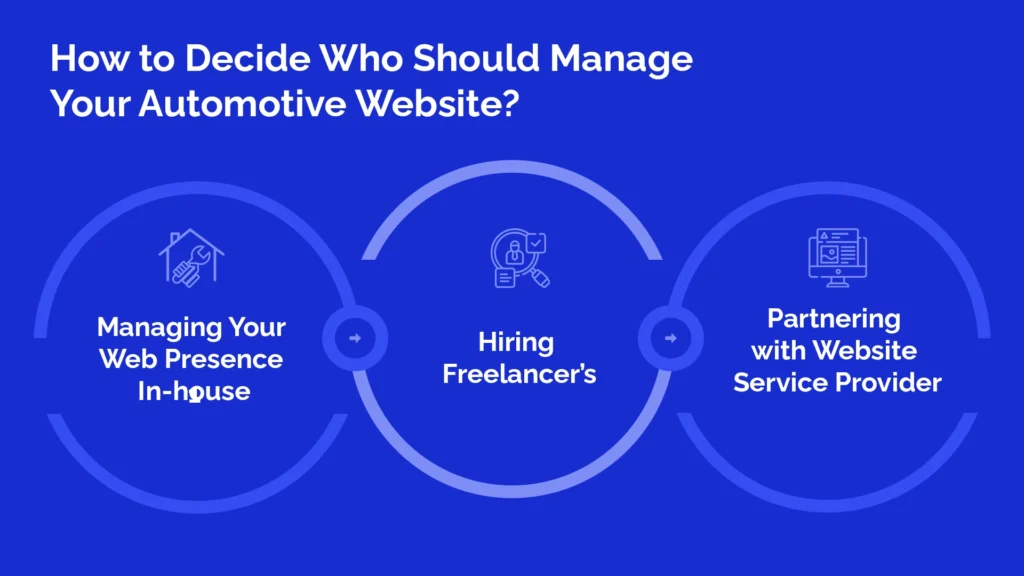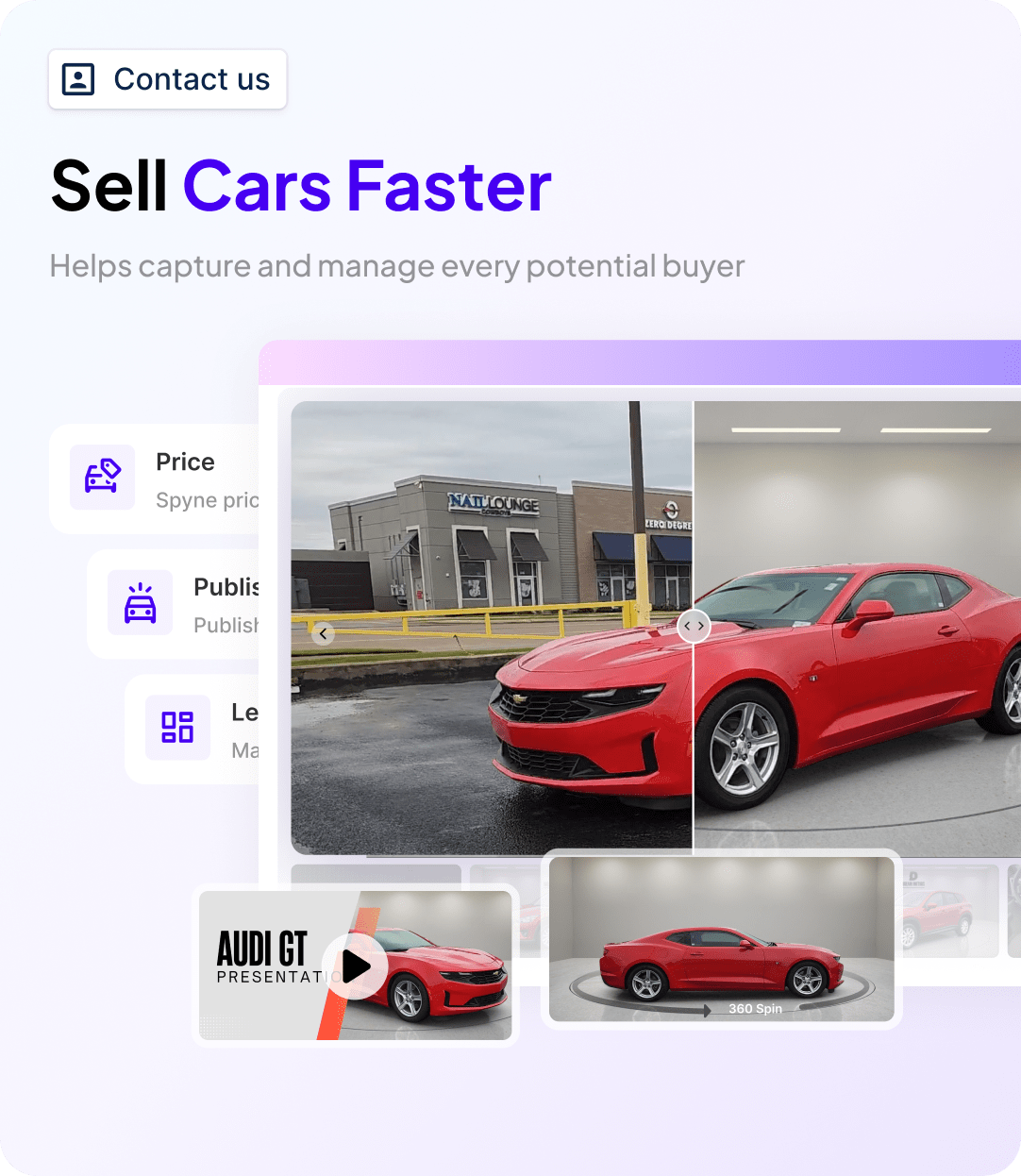Building a professional and engaging website ensures you stand out from your competitors. However, managing it requires a specialized skill set that is complex and time-consuming. Therefore, you can hire a website management service provider to keep you relaxed about your online presence. Therefore, in this blog, we will learn why web management services are important and how you can choose the right service provider to ensure your online business is successful.
What is a Website Management Service?
Website management service is a process that ensures the website looks professional, is secured, contains the latest information, and functions appropriately. It incorporates long-term development, general maintenance, guaranteeing security, organizing and implementing marketing strategy, and website content delivery. Additionally, website management involves basic tasks such as performing maintenance, implementing design updates, planning and delivering content updates, providing web support, planning future market growth, achieving a consistent user experience across channels, and ensuring content can be reused in various contexts.
Why is Professional Website Management Service Important?
A professional website management service is essential to ensure your website stays up-to-date, looks visually satisfying, and ranks higher on search engines. Additionally, it will also help your website users have a positive experience navigating your brand online. Therefore, regular service maintenance keeps your website running smoothly and prevents potential issues like updating software, optimizing images, checking broken links, and backing up the website.
1) User Experience: As per a global research company, every $1 invested has a $100 ROI. Additionally, effective website management ensures a site is visually appealing, easy to navigate, and provides a positive user experience.
2) Content Freshness: Adding new content and regularly updating a website will keep it relevant and fresh and help improve its search engine ranking.
3) Technical Performance: Monitoring and fixing technical issues, such as loading errors and broken links, ensures the website functions correctly and is available to web users.
4) Security: Web management services also include implementing measures to protect users and websites from security threats like hacking attempts and malware.
5) Brand Reputation: Managing your brand website will build credibility and trust with users. Additionally, it can help you avoid the potential loss of donors and customers, which can damage your brand’s reputation.
Key Components of Web Management Services
Core elements of website management help to maintain a smooth and seamless web experience for users. Additionally, web services, including design and technical performance, are essential to maintain a well-functioning automotive ecommerce store.
1) Security
It is essential to prevent hacks and ensure the security of your customer’s data, such as their credit card and address information. Additionally, consider the security practices mentioned for your web management.
- Maintaining Security Certificates: The most popular security certificate is SSL, which tells every user that no one can access the site. Remember, when a site has an SSL certificate, the URL starts with “HTTPS,” not with “HTTP.”
- Regular Site Backups: Return your website to normal after malfunction or hacking. Therefore, you can maintain backup files and capture their code after every change.
- Regular Updates: Keep your website updated to avoid any security vulnerabilities. Therefore, you must accept and review the updates regularly.
2) Accessibility
Some web standards for accessing your website are designed to support users with disabilities, such as learning, deafness, and blindness. Therefore, Web Content Accessibility Guidelines are the universally accepted standards. Additionally, web managers must adhere to the three important practices mentioned.
- Text Alternatives for Non-text Content: To ensure that users who can not hear or see can understand your content, you must provide audio captions, video transcripts, and image alt text.
- Contrast and Color: To convey information to color-blind users, you must use sufficient contrast between background colors and text and can avoid using color in your content.
- Accessible Forms: You must provide easily understandable instructions and error messages. Additionally, ensure all the form controls are accessible from the keyboard.
3) Technical Performance
A website manager must ensure that each page loads quickly and on all devices without any errors. Therefore, they can follow the best web development practices like mobile-first HTML/CSS to update broken links and ensure image size. Additionally, they can review CMS web design, apps, plug-ins, and hosting provider to ensure they have the correct suite of services for their web performance requirements.
4) On Page SEO
Automotive SEO is an organic practice that helps your website rank higher in search results. Therefore, On-page SEO, a subset of this practice, is focused on making any changes on the site that help search engines find and understand your content. Additionally, On-page SEO for web managers includes ensuring the correct use of Google Search Console to detect errors, reviewing the internal linking structure, and properly using headers and title tags.

5) Design
Website management is not limited to technical practices. Further, having a visually appealing website and a user-friendly interface is essential for your brand’s online success. Additionally, when launching a new landing page or product page, you must redesign your web pages. Therefore, as trends and tastes change over time, updating your web design and management to match your user’s expectations is essential.
6) Google Analytics
The website management team must know Google Analytics and Google Search Console to offer a user-friendly website with worthy traffic. Additionally, it will help optimize the essential data correctly for your sales team.
7) WordPress Expertise
Choose a website management service provider who understands WordPress. Ensure they offer convenient maintenance plans, such as a website that loads swiftly, provides backups, and has optimized codes.
Types of Website Management Services
Site management services are designed to meet your automotive business needs. Therefore, various web management services are available, and we have mentioned the most popular and common types below.
1) Web Management Services for Small Businesses
Small businesses that lack an in-house IT team can opt for these services. Additionally, these services can be customized to suit a business’s budget and needs, including content management, security management, upgrades and updates, and website maintenance.
2) E-commerce Website Management Services
They specialize in managing online automotive stores and ensure that they function optimally. Additionally, this service is essential for auto businesses relying heavily on online stores to generate revenue. Therefore, the service includes order management, product updates, inventory management, and payment processing.
3) Full-Service Web Management
It is a comprehensive solution that covers every aspect of web management and ensures that the brand’s website functions optimally. Therefore, these services include security management, website maintenance service, web development and design, and web content management systems.
4) Website Management Companies
These companies serve as a one-stop shop for auto businesses that require web management services. Therefore, they offer numerous services with different packages that cater to different needs and budgets. These include content management sites, website updates, maintenance, etc.
How to Decide Who Should Manage Your Automotive Website?
Many automotive businesses are willing to invest in website management to keep their online presence updated. However, making a smart decision can be challenging. Therefore, the following will help you narrow your decision-making.
1) Managing Your Web Presence In-house
Many small businesses believe they will receive free website management services when they do it in-house. However, they spend a few hundred dollars a month to manage their websites in-house. Therefore, most do not see any positive results from their efforts. However, this does not mean this approach is effective; it is rarely fully implemented.
| Pros | Cons |
| You can leverage the expertise of your employees who are already your staff. | Individuals who manage your website need to gain professional skills or expertise. |
| Hiring a maintenance team can save the company money on any additional overhead costs. | There is a lack of resources to scale efforts when there is a complex problem with the website. |
| There will be an on-premise service if there is a problem or technical error. | Contact an external expert to handle complex situations is needed. |
| You will have more direct control of your business’s website. | You will lack best practices and benchmarks against which to measure performance. |
2) Hiring Freelancer’s
Many businesses also hire freelancers to handle individual tasks on one-time projects. Therefore, these freelancers are hired to complete the individual project and then move on.
| Pros | Cons |
| You only pay for what you need with one-time projects. | Freelancers might not be constantly available, as they do not have any standard hours. |
| You can hire specific individuals for specific projects based on their expertise. | There is no one to monitor them constantly and to keep track of their work. |
3) Partnering with Website Service Provider
You can hire long-term automotive website providers that handle all the intricacies of your auto website. Therefore, hiring them will allow you to scale your efforts quickly.
| Pros | Cons |
| You get a quick response and resolution on any technical problem of your website. | They are expensive compared to freelancers. |
| They can also guide your staff to resolve smaller issues by themselves. | These companies have multiple clients, focusing on numerous projects at a time. |
| You get hands-on monitoring of your website management and performance. | A dedicated employee to communicate with the web management service providers is required. |
| You get scalable services and have to only pay for the services you opt for. | Data breaches are risky if the agency doesn’t have robust security measures. |
Best Website Management Tools for Your Business
To manage your website, you require reliable and efficient tools. Therefore, we have mentioned the website management services list as one of the top tools an automotive business can consider for its best website management services.
| Categories | Tools |
| Hosting Plan: Choose a hosting control panel to manage your website and files hassle-free and to focus on your content quality. |
|
| Content Web Management System & Website Builder: It helps you build and manage your website without coding. However, a website builder is more practical, providing built-in tools to optimize your website without installing additional software, such as widgets or plugins. |
|
| eCommerce Website Management Services Tools: These website management tools are required to run a well-functioning e-commerce website and e-commerce website management services. |
|
| File Management Tools: The tools increase your team’s collaboration and productivity in business management and content planning. |
|
| Business Email: A customized email will make your automotive business look more professional and legitimate and help you gain the trust of your existing and potential customers. |
|
| Site Performance Tracking Tools: These tools help you track website performance and improve your website structure and loading speed for better accessibility and user experience. |
|
| SEO Tools: SEO helps generate more conversions, drive more traffic from organic searches, and ensure your website ranks higher on the SERPs. |
|
| Social Media Tools: These tools help brands increase conversions and awareness and engage with customers by planning and managing their content for social media accounts. |
|
| Email Marketing Tools: Email marketing tools generate more sales and establish a loyal customer base. Additionally, it helps to create personalized messages to inform customers about important announcements, newsletters, and special offers. |
|
How Much Does it Cost to Manage an Automotive Website?
Website management packages depend on various factors, including the website’s size. Therefore, web maintenance costs typically between $20 and $5000 per month. Further, businesses invest about $300 – $60,000 annually in website maintenance.
- Domain names cost $10 – $130 per year.
- Secure Sockets Layer certificate costs $ 8- $160 per year.
- Website hosting costs $2 – $500 per month.
- General website upkeep costs $15 – $105 per month.
- Most popular web content management systems (CMS) cost $0 – $3500 monthly.
- Tech support costs $0 – $3500 per month.
- Ecommerce system maintenance costs $5 – $15 per month.
- Plugins cost $0 – $50 per month.
Best 12 Tips To Find The Right Website Management Service Provider
Choosing the right website maintenance provider is essential to ensure your website’s performance, security, and health. Therefore, we have mentioned the key factors when selecting the top website management services provider.
1) Experience and Expertise: You must look for the website maintenance provider’s relevant experience and proven track record.
2) Services Offered: Check the range of services the agency offers and ensure it covers all essential aspects, such as web maintenance, SEO, performance optimization, content updates, backups, and security updates.
3) Security Measures: A reliable provider should prioritize securing your website. Therefore, inspect the service provider’s security protocols, including how they handle potential vulnerabilities, malware scans, and regular security audits.
4) Response Time and Support: A quick response is essential to minimize downtime and address critical issues. Therefore, understand the agency’s ongoing support and response time for emergencies they offer.
5) Reputation and Reviews: Check the testimonials and reviews from past clients and look for feedback regarding the effectiveness, professionalism, and reliability of their management services.
6) Scalability: A scalable solution ensures that your online presence expands and maintenance needs are met. Therefore, consider whether the provider scales its services to accommodate your business website growth.
7) Communication and Reporting: Understand how the provider communicates with performance reports, issues, and updates. Therefore, this will help you stay informed about your site’s status.
8) Cost Structure: Ensure the provider’s pricing model aligns with your business budget and the scope of the maintenance your automotive website requires.
9) Customization Options: Check if the provider can tailor its services to your needs and offer flexibility.
10) Legal and Compliance Considerations: Ensure the provider is aware of relevant legal requirements, such as data protection laws.
11) Technology Compatibility: Choose a provider that is familiar with the new technology and has expertise in integrating and maintaining it.
12) Contract Terms and Termination Policies: Review the policies and contract terms to understand your flexibility to terminate the agreement if necessary to adjust their services.
Top 5 Affordable & 24/7 Available Website Management Companies
Automotive website management requires specialized expertise to showcase inventory effectively, engage customers, and drive sales. Therefore, below are the five website management examples in this domain.
1) Spyne
Spyne.ai is an AI-powered solution for businesses in the automotive industry. Therefore, it offers comprehensive and innovative website design, development, and management services. Additionally, it focuses on improving dealerships’ inventory visuals and manages their website pages. Therefore, its user-friendly and visually attractive approach converts prospects into paying customers.
2) Dealer.com
Dealer.com is known for its strong focus on user experience and lead generation. Therefore, it offers comprehensive website design, development, and hosting solutions. Additionally, it also provides tools for inventory management, CRM integration, and digital marketing campaigns.
3) Motive
Motive emphasizes data-driven strategies and performance optimization. Therefore, they specialize in creating high-performing websites that convert leads into customers and offer website design, development, SEO, digital marketing, and hosting services.
4) Dealer Inspire
Dealer Inspire provides a platform for building and managing automotive websites. Therefore, its focus is on delivering a seamless customer experience and offers a range of features, including digital marketing tools, CRM integration, and inventory management.
5) Jazel
Jazel is known for its innovative approach to automotive website design and website development and management. Additionally, they offer a suite of tools for website management, inventory management, and digital marketing.
How Spyne Leading Strategies Help in Website Management?
Spyne.ai helps automotive businesses build customized websites with the help of their automotive website templates. Furthermore, we ensure that you provide an exceptional future experience in managing your website. Therefore, with the best and most professional web management specialists team, they ensure you integrate the latest technologies and tools into your website. Spyne includes content management, SEO management, website visual appearance, DMS, CRM, and many more when managing your business’s website. Additionally, we provide tailored solutions for your business and ensure a higher ROI when you choose us to manage your website.
Conclusion
Automotive businesses must have an effective website. Therefore, to unlock the full potential of your online presence, partner with a reliable website management service provider and automotive website builder like Spyne. Therefore, Spyne offers comprehensive solutions tailored to your needs, from website design to development to security and optimization.















